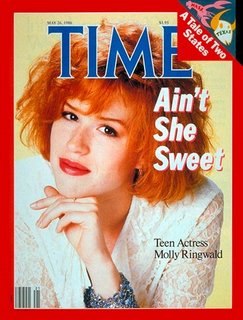Twenty Years Ago Today...

this was the cover of Time. You know what's more than a little insane, other than the fact that Molly Ringwald somehow meant enough to the culture, or at least to the people who made the culture by writing about the culture, that she made it on to the cover of a major newsweekly? I still have a copy of this exact issue somewhere in my apartment. I think I read this story over and over the week it came out. I was thirteen. I remember that they mentioned her eating onion rings with ketchup and shopping for either Shiseido or Shu Uemura lipstick or eyeshadow in some Beverly Hills mall and that her jazz musician father, Bob, was blind. I guess when you're the kind of thirteen-year-old that I was--pale, plumpish, non-standard-issue, went around wishing she lived in the late nineteenth century or early twentieth, whichever--you would be pretty desperate for some sign from the outside world that you didn't have to be otherwise. I suppose that legions of cultural studies grad students have churned out papers on this topic, so you don't need me to wax on about it. Although it does now occur to me that my two formative girlhood obsessions involved two redheads with similar spirits: Anne of Green Gables and the Ringwald. More on the Ringwald: I went to a party once at her house and she complimented me on my dress. I really did think I could leave New York then--or get hit by a truck that night--and die happy. I had been to London, Paris, and Rome, and now Molly Ringwald approved of my dress. What did it matter that I was never going to be Joan Didion or Elizabeth Hardwick, or even Lorrie Moore? It has occurred to me quite a bit lately that if I was a man, all my youthful obsessions--comic books, rock bands, science fiction, movies, my raging or sputtering hormones--would make legitmate subjects for generation-defining novels. But if I wrote a novel that was a fantasia on the American dream involving Seventeen, the Smiths, Molly Ringwald, Laura Ingalls Wilder, and Anne of Green Gables, it would not seem as grand or important a narrative. I have to admit a novel predicated on those cultural touchstones, as I think about it, does sound silly--it's sort of inducing a sprigged-muslin shame spiral--but maybe it wouldn't be silly. I mean, if you got Jonathan Lethem to do it.

<< Home